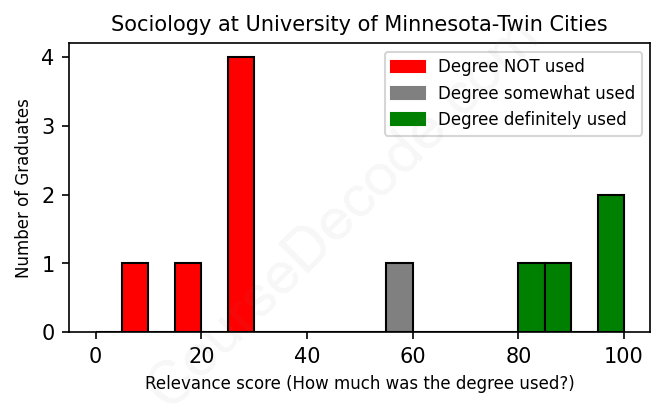
First, some facts. Of the Sociology graduates from University of Minnesota-Twin Cities we've analyzed , here's how many have used (or NOT used) their degree in their career:

These are estimates based on AI analysis of 11 LinkedIn profiles (see below).
The verdict? Significantly below average. Overall, with an average relevance score of 50%, Sociology graduates from University of Minnesota-Twin Cities have a much lower likelihood (-17%) of finding work in this field compared to the average graduate across all fields:
And for comparison, here's the chart for all profiles we've looked at across all degrees.
Also, after graduating, only 18% of these graduates have pursued further education other than another Bachelor's degree (such as a Masters degree or other), compared to the average across all profiles of 35%. This suggests a Bachelors degree is enough for most Sociology graduates, and it's normal to look for work straight after graduation.
See the details:
|
Relevance score: 100% We think this person has gone into a career highly relevant to their degree. We think this person has gone into a career highly relevant to their degree.
DEGREE INFOGraduated in 2014 from University of Minnesota-Twin Cities with a Bachelor's degree in Sociology. No other secondary education since. JOB HISTORY SINCE GRADUATIONShelter Worker Avenues for Homeless Youth Jun 2016 - Mar 2018 Housing Case Manager  Our Saviour's Community Services Jan 2017 - Present ABOUTI am actively seeking a full-time paralegal position for a mission driven organization that allows me to leverage my expertise connecting with and coaching disadvantaged individuals and my recently obtained ABA Paralegal Certification. |
The top 10 most common jobs done by the graduates we've analyzed (ranked most common to least) are:
Here is a visual representation of the most common words in job titles for Sociology graduates (this is across all Sociology graduates we've analyzed, not just those who went to University of Minnesota-Twin Cities):

When you check out the career paths of graduates from the Sociology program at the University of Minnesota-Twin Cities, you can see a bit of a mixed bag. Right after graduation, many seem to land their first jobs in roles that involve some level of research, analysis, or management, but the areas can range quite a bit—from housing case management to roles in big-name companies like Wells Fargo and Bain & Company. For example, some graduates jump right into internships that connect directly with social issues, like working with the homeless or in educational programs, which makes sense given their Sociology background. However, there are also folks who veer more towards corporate roles that might stray a bit from the direct application of their degree, like project management or sitting pretty in sales positions.
Fast forward five to ten years down the line, and you can spot a trend where many graduates have found themselves in solid careers that leverage their skills and experiences gained in Sociology. For instance, positions related to research and analysis have really become common, especially for those who took internships seriously right out of the gate. Others have scaled the corporate ladder—like those who started in operational roles at places like C.H. Robinson and have moved into management positions. But there are also some who took paths that seem less directly tied to their Sociology studies, showing that while a Sociology degree offers a great foundation for many careers, it can sometimes lead people to pursue unrelated positions. Overall, it looks like those who actively sought experience linked to their studies tend to find fulfilling careers, while others might find themselves somewhat off-course as they navigate their work life.
The Bachelor degree in Sociology at the University of Minnesota-Twin Cities is generally considered to be pretty manageable, especially if you're interested in the subject. They're known for offering a solid mix of theory and real-world application, so as long as you stay engaged and keep up with the readings and assignments, you should be fine. It might be a bit tougher if you're not into the whole social issues and research thing, but if you like to think about society, culture, and human behavior, you might find it more enjoyable than challenging. Overall, it’s roughly on par with a lot of other bachelor degrees—there are easier ones, and there are definitely harder ones, but it’s definitely doable with a little effort!
Most commonly, in the LinkedIn profiles we've looked at, it takes people 4 years to finish a Bachelor degree in Sociology.
When it comes to these Sociology grads from the University of Minnesota-Twin Cities, it seems like they have taken a pretty varied approach to their careers, and the money they're making reflects that diversity. Some have landed solid roles in established companies like Bain & Company or Wells Fargo, which usually means they're earning a decent salary, especially as they climb the ranks. Others, like those that started in nonprofit work or smaller companies, might not be raking in the big bucks, especially if they’re in entry-level or support roles. Overall, while some have probably found their way to comfortable salaries, others might still be working their way up or just making ends meet. So, it’s a mixed bag—some doing really well, and others still figuring it out!
Here is a visual representation of the most common words seen in the "about" section of LinkedIn profiles who have a Bachelor degree in Sociology (this is across all Sociology graduates we've analyzed, not just those who went to University of Minnesota-Twin Cities). This may or may not be useful:

Here are all colleges offering a Bachelor degree in Sociology (ordered by the average relevance score of their Sociology graduates, best to worst) where we have analyzed at least 10 of their graduates: